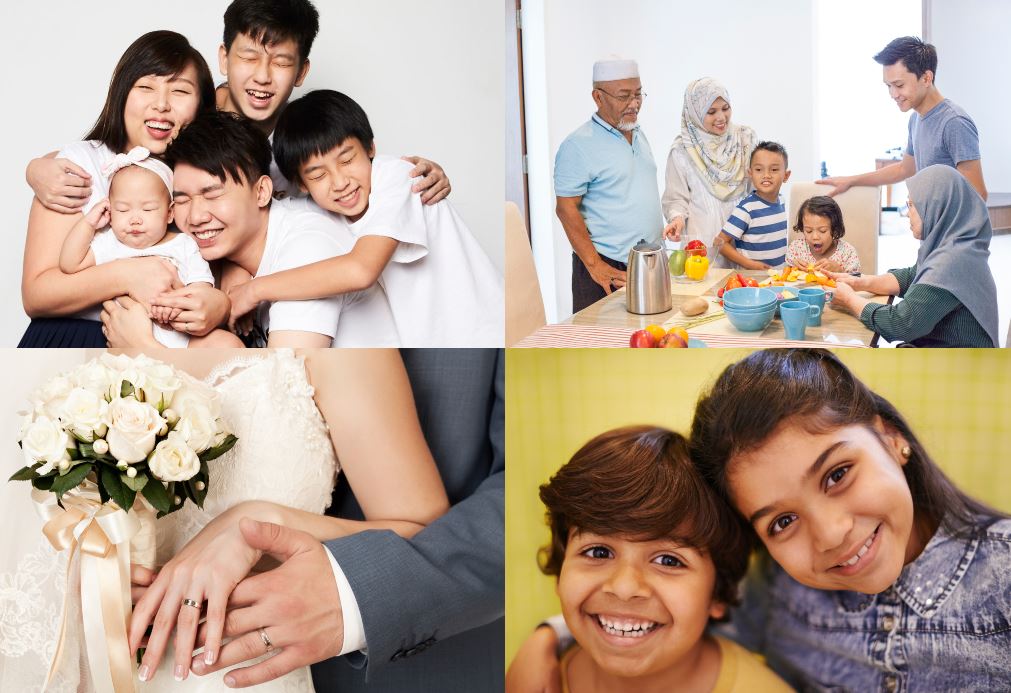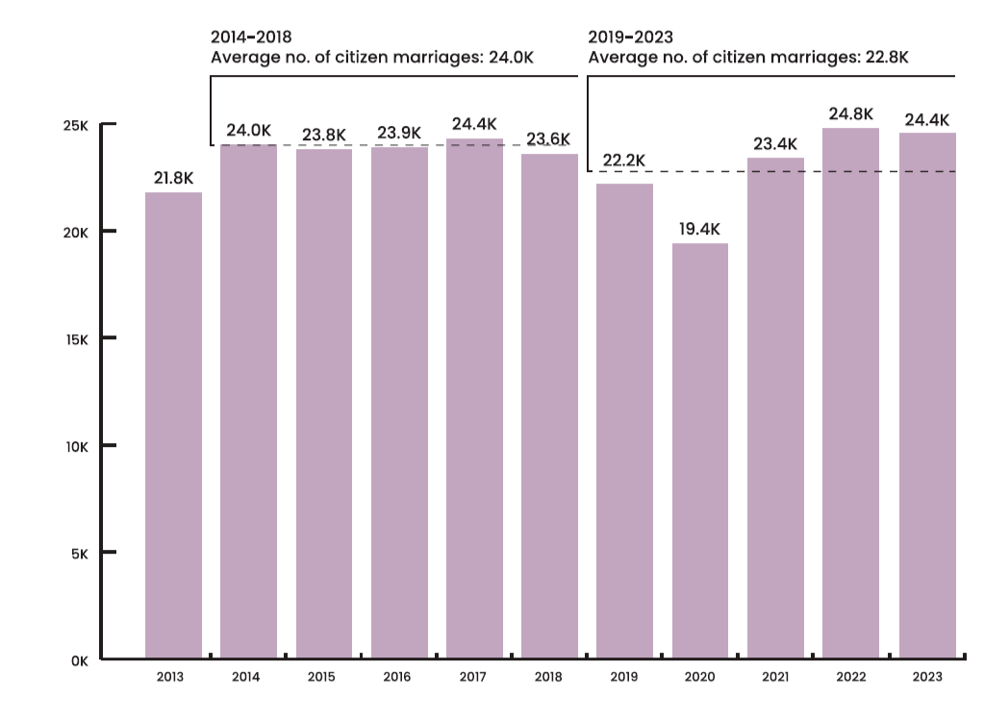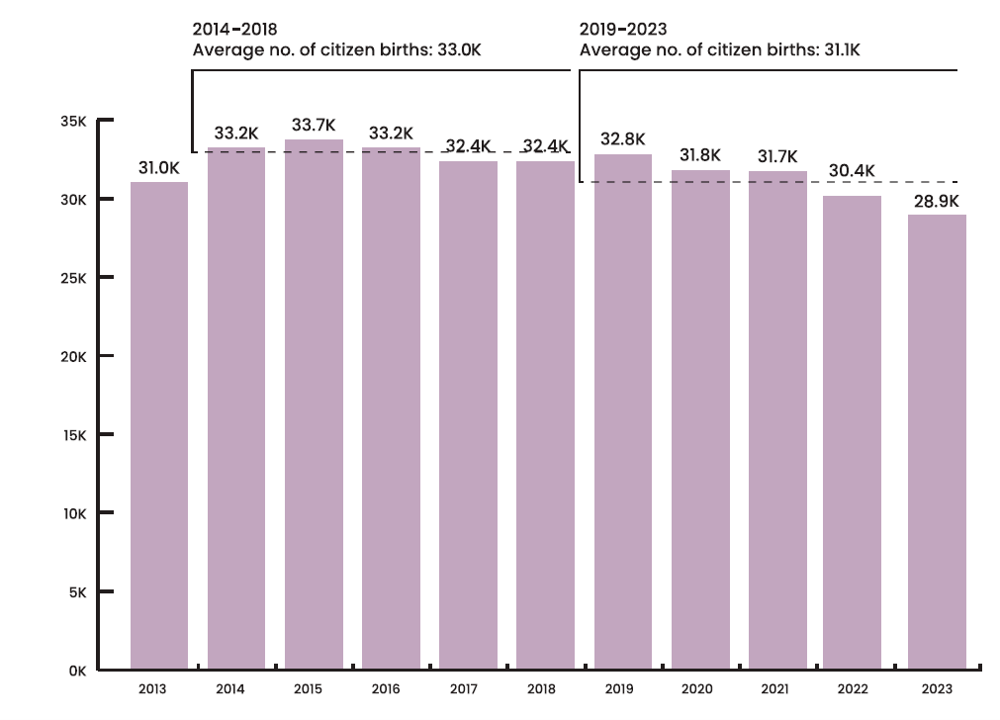Marriage & Parenthood

Marriage and Parenthood Trends
In 2023, there were 24,355 citizen marriages, 1.7 per cent fewer than the record high of 24,767 citizen marriages in 2022 (Chart 3)[1], but higher than the 22,165 citizen marriages in 2019 (pre-COVID).
The average number of citizen marriages per year in the last five years (22,800) was lower than in the preceding five years (24,000). The median age at first marriage for citizen grooms and brides was 30.7 and 29.0 years in 2023, up from 30.1 and 27.8 years respectively in 2013.
Chart 3: Citizen marriages, 2013 – 2023

Source: Department of Statistics
The figures are based on the full calendar year (January to December).
There were 28,877 citizen births in 2023, 5.1 per cent fewer than the
30,429 citizen births in 2022 (Chart 4)[2]. The average number
of births per year in the last five years (31,100) was also lower than
in the preceding five years (33,000).
Chart 4: Citizen births, 2013 – 2023

Source: Immigration & Checkpoints Authority
The figures are based on the full calendar year (January to December).
The resident total fertility rate (TFR), which has generally been declining over the past few decades, was 0.97 in 2023[3]. The decline may have been exacerbated by the COVID-19 pandemic, which resulted in economic uncertainty and disrupted marriage and parenthood plans for some Singaporean couples. The decline in TFR is also happening in other advanced societies, where more people are postponing family formation and having fewer children, due to reasons such as the prioritisation of careers, shifting attitudes towards marriage and parenthood, and concerns about child-raising costs.
Ultimately, getting married and having children are personal decisions, influenced by changing social norms, personal priorities, and economic sentiments. Young Singaporeans have consistently expressed a strong desire to get married and have children. From our 2021 Marriage & Parenthood survey, 8 in 10 young singles aspire to get married and have children, and over 9 in 10 married Singaporeans want at least 2 children. These sentiments have held firm since our surveys in 2012 and 2016.
Support for Marriage & Parenthood
Supporting Singaporeans to fulfil their aspirations to marry and have children continues to be our priority. Through close partnerships across Government agencies, and with community partners, employers, businesses and the broader society, a range of support is available to Singaporeans at every stage of their marriage and parenthood journey. The Marriage & Parenthood Package provides comprehensive support to help couples start and raise their families. Key measures in the Package include:
-
Priority housing schemes and grants to help couples own their first home
-
Healthcare schemes to defray the costs of assisted conception, maternity and newborn care
-
Financial support through the Baby Bonus scheme, comprising a Cash Gift and Government co-matching contributions to the Child Development Account
-
MediSave Grant for Newborns to defray children’s healthcare expenses
-
Government-Paid Parental Leave schemes including Maternity Leave, Paternity Leave, and Childcare Leave
-
Subsidised infant care and childcare services
As announced at Budget 2023, the Government has increased support for parents during their children’s early years, by enhancing the Baby Bonus Cash Gift and Child Development Account contributions. Government-Paid Paternity Leave (GPPL) doubled from 2 to 4 weeks, on a voluntary basis, and Unpaid Infant Care Leave has also doubled from 6 to 12 days per parent per year, starting from 1 January 2024. During the 2024 National Day Rally, Prime Minister Lawrence Wong has also announced that the two weeks of voluntary Government-Paid Paternity Leave (GPPL) will be made mandatory from 1 April 2025. A new Shared Parental Leave (SPL) Scheme will also be implemented in two phases from 1 April 2025, starting with 6 weeks of parental leave to be shared between both parents from 1 April 2025. This will increase to 10 weeks to be shared between both parents from 1 April 2026.
In addition, measures are in place to help parents manage their work and family commitments. For example, the Tripartite Guidelines on FWA Requests will come into effect on 1 December 2024 to require employers to properly consider employees’ formal FWA requests, and encourage both sides to have constructive discussions to work out FWAs that are mutually beneficial. The Tripartite Standards on Work-Life Harmony and Unpaid Leave for Unexpected Care Needs were also established in 2021 and 2018 respectively, to highlight good employment practices that all employers are recommended to implement at their workplace.
More details on all the support measures can be found at go.gov.sg/mpbooklet and madeforfamilies.gov.sg. Parents may also use the Family Support Calculator in the LifeSG app, to find out how much benefits they can receive.
Beyond these, we must all do our part to ensure that Singapore is a great place to start and raise families. The Made For Families initiative was launched in June 2020 to further assure families of support from the Government and the broader society, and to encourage more businesses and community groups to play a part in building a family-friendly environment. Organisations can submit their request to adopt the Made For Families brand mark here, to identify themselves as entities promoting the value of family in our society.

[1] Citizen marriages refer to marriages involving at least one citizen.
[2] Citizen births refer to babies born to at least one citizen parent.
[3] Total fertility rate refers to the average number of live-births each female would have during her reproductive years (15-49 years old) if she were subject to the prevailing age-specific fertility rates in the population in the given year.

